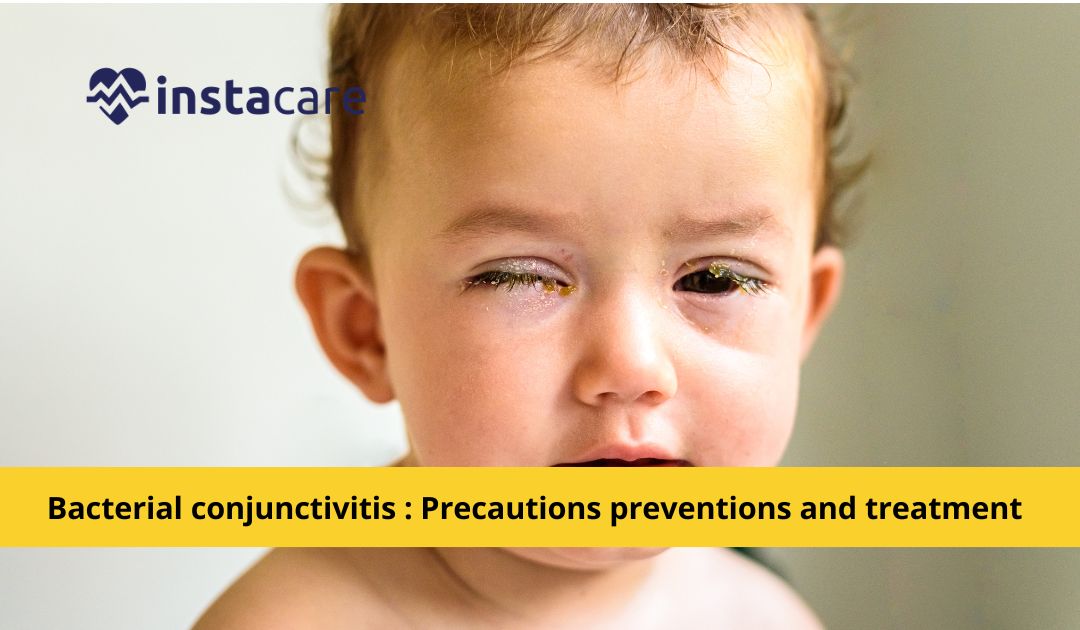Are you experiencing redness, itchiness, and possible
discharge in your eyes? If so, you may be suffering from bacterial
conjunctivitis. Also known as “pink eye” this infection is highly contagious
and requires swift treatment to avoid further infection or permanent damage
that can result due to the irritation of the mucous membranes near the cornea.
In this blog post we will discuss common symptoms associated with bacterial
conjunctivitis; preventive measures all those concerned should take when
exposed to an infected individual; and how it can best be treated – including
both medications available at a doctor’s office as well as home remedies for
alleviating the discomfort while allowing it to heal on its own. Start reading
below before learning more information about this evil infliction!
What is conjunctivitis and how does it spread?
Conjunctivitis, commonly known as pink eye, is an eye infection caused by viruses, allergens, and bacteria. However, the case of bacterial conjunctivitis is often caused by exposure to certain bacteria such as staphylococcus aureus or streptococcus pneumonia. This infection typically spreads from person to person through direct contact with infected eye discharge.
Touching an infected person's eye or sharing items such as towels, linens, and eye makeup can easily transmit the infection. Although it can be an uncomfortable and irritating condition, the good news is that bacterial conjunctivitis is easily treatable with antibiotics and typically clears up within a few days.
Here are some types of Conjunctivitis!!
Viral Conjunctivitis:
Viral conjunctivitis, commonly known as pink eye, is a highly contagious infection that affects millions of people every year. It is caused by a virus that spreads easily through contact with contaminated surfaces or bodily fluids. The symptoms of conjunctivitis include redness, swelling, a gritty feeling in the eye, and excessive tearing or discharge.
While the infection is typically not serious, it can be very uncomfortable and can quickly spread to others if proper precautions are not taken. If you suspect that you or someone you know has conjunctivitis, it is important to take steps to prevent the infection from spreading and seek medical attention if necessary.
Bacterial Conjunctivitis:
Bacterial conjunctivitis is an uncomfortable and contagious eye infection that can cause redness, swelling, and discharge. This condition is caused by a bacterial infection that is easily spread from person to person through contact with contaminated surfaces or bodily fluids.
It can affect individuals of all ages but is commonly seen in young children and those who work or live in close quarters. If left untreated, bacterial conjunctivitis can lead to more severe eye infections and even vision loss in rare cases. Therefore, it is important to seek medical attention if you or someone you know are experiencing the uncomfortable symptoms of this eye infection.
Allergic conjunctivitis:
Are itchy, red, and watery eyes driving you insane? You may
be suffering from allergic conjunctivitis, a condition that causes eye
irritation due to an allergic reaction to substances like pollen, pet dander,
and dust mites. Although it's not a serious condition, it can be extremely
uncomfortable and distracting. To alleviate symptoms, it's important to avoid
triggers whenever possible, use over-the-counter eye drops, and limit exposure
to common allergens. So, don't let allergic conjunctivitis get in the way of
enjoying your day. Take action and find relief today!
What are the symptoms of conjunctivitis?
If you've ever experienced eye irritation, you know it can be incredibly uncomfortable. Conjunctivitis, commonly known as pink eye, is a condition characterized by inflammation of the conjunctiva - the thin membrane covering the white part of the eye and inner eyelids. While it's often associated with pink or red eye(s), conjunctivitis can also cause other symptoms such as itching, swollen eyes, and a gritty feeling in the eye.
Some people may also experience watery discharge or crusty eyelids upon waking in the morning. If you're experiencing any of these symptoms, it's important to seek medical attention to properly diagnose and treat your condition.
Who is at a higher risk of contracting the infection?
Bacterial conjunctivitis, also known as pink eye, is a highly contagious infection that affects the outermost layer of the eye. Those at a higher risk of contracting the infection include individuals who come into close contact with others, such as children in daycare centers or healthcare workers, as well as those with weakened immune systems. Symptoms of bacterial conjunctivitis include redness, swelling, and a discharge from the eye.
While it can be uncomfortable and sometimes painful, the infection can be easily treated with antibiotics prescribed by a medical professional. It's important to take precautions to prevent the spread of bacterial conjunctivitis, such as washing your hands frequently and avoiding touching your face or eyes.
Conclusion
In summary, bacterial conjunctivitis can be highly contagious and detrimental to eye health if left untreated. Taking precautionary steps such as avoiding touching your eyes with unclean hands and frequently washing any contaminated surfaces is crucial in limiting the spread of infection. Practical treatments involve using warm compresses several times a day and antibiotic eyedrops, while more severe cases may require oral medications or further medical intervention.
While bacterial infections are uncomfortable and sometimes hard to avoid, they can be successfully managed with the proper preventive measures and treatment. So if you have any questions or concerns about this condition, be sure to consult an optometrist or ophthalmologist for professional guidance—your eyes will thank you for it!


